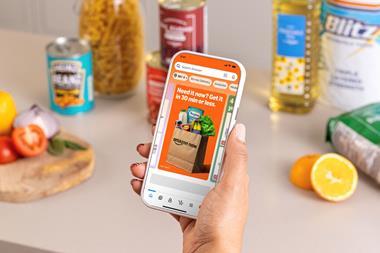Retailers are switching on to the fact that cost-effective, integrated communication and collaboration tools can positively enhance the work experience for retail staff, enabling them to attract and retain more store associates. Find out how this can help contribute to a more positive customer experience while helping to get more value from your budget in 2023.
Grocery retailers in the UK are facing a perfect storm. Inflation is still surging, staff costs are rising, yet margins remain under pressure. This is especially true for smaller shop chains that must still co-ordinate operations across multiple stores, without the same economies of scale as the supermarkets they’re competing with.
Cutting costs while maintaining footfall might seem like an impossible task, but there are still ways medium-sized retailers can innovate – to strengthen their organisation and attract customers through the door, without increasing overall spending.
Store associates are the key to a differentiated customer experience
Given the well-documented shortage of UK retail workers, employers will need to improve the support and employee experience for shopfloor staff, boosting wellbeing and engagement to remain competitive. To better understand how to achieve this, we carried out additional research as part of our ongoing Work Trend Index, surveying thousands of frontline employees and managers in eight industries across five continents – including a specific focus on retail.
Being a store associate is tough enough already, especially if they’re younger, less experienced, and left alone to deal with unhappy customers. Yet they’re facing additional challenges, too, with most frontline retail workers saying leadership does not prioritise building workplace culture, and just over a third warning they are not equipped with the digital tools, tech or solutions they need.
Indeed, more than half say they receive no formal training, even when they can access the tools they need, and most workers also see the year ahead as being more difficult than the last.
The shorter-term nature of some retail work contracts is insufficient justification for this lack of investment. As the adage says – don’t ask, ‘What happens if I train them and they leave?’, think about ’What will happen if I don’t train them and they stay?’

Empower staff with the right, cost-effective technology to create a virtuous circle
Our research discovered clear signals about the opportunity to align retail business outcomes with the wellbeing and growth of employees, and how tech can help.
The top three solutions frontline workers say could reduce stress are: a pay increase; taking paid time off; and better technology. Perhaps it’s unsurprising, then, that since the pandemic, the adoption of Microsoft Teams in the retail sector – to help improve staff and customer communication and collaboration – has increased by 338%.
So, instead of unhappy staff leading to poor service and angry customers, which leads to more worn-out store associates, it’s possible for the opposite effect to take place: driving positive momentum by giving staff the tools and data they need to provide a better service, which means fewer customer complaints, and happier, more engaged staff.
For the last few years, Microsoft has collaborated with Marks & Spencer (M&S) which, despite facing a challenging retail environment, has kept finding ways to better connect managers and associates. And because the tools M&S uses are just as suitable, flexible and affordable for smaller shop chains, the benefits of its approach are worth considering.
For example, M&S store managers have been provided with Surface Go, a portable touchscreen 2-in-1 PC, so they have all the information they need at their fingertips – from sales reports to inventory. This means they can spend less time in the office and more on the shop floor, supporting store associates and staying in touch with customers. When this hardware is combined with communications software, such as Microsoft Teams, colleagues have a single collaboration and information hub through which they can contact anyone quickly, wherever they are. Store associates also have the option of using their personal mobile phones by downloading the Teams mobile app, which helps keep all company communications in one place on the device, and can be managed and secured by IT.
Smaller retailers can even bring costs down with Microsoft 365 Business Premium and save up to 50% of their current tech spend – because it includes Teams, Defender for Business, and consolidates so much into a single platform. Instead of paying multiple vendors, and having to learn and manage multiple apps, from chat and video to task management and device security, retail staff save time and energy because everything is integrated in one place. Store associates can even use the Shifts app in Teams to manage rotas.
Watch how Marks & Spencer empowers sales floor employees.
Five ways medium-sized retailers can get more value from their budget in 2023
1. Don’t underestimate store workers’ appetite for quality tech
Our findings show 60% of retail workers are excited about the job opportunities that technology can create. If solutions work well and solve real problems, they will be adopted and create value. Areas where frontline workers think tech can help with most, include team scheduling, onboarding new teammates, automating repetitive tasks, providing real-time task updates, and managing appointments.
2. Streamline low-value, repetitive tasks to give staff more time back
Staff are especially keen on tools that save time and energy by working more efficiently and automating or accelerating lower-value tasks. For example, the Shifts app in Teams helps retail managers quickly create, update and manage store associate shift schedules, and message people individually or together, while also making it easy for staff to see rotas and make requests.
Teams also features apps such as: Bookings – which can automate customer appointment scheduling and management; Planner – to help organise teamwork with intuitive, collaborative, visual task management; and Forms – to quickly create surveys and polls to get store associate feedback. So, there are multiple built-in options available for making frontline workers’ days a little easier.
3. Connect staff back to the organisation, and each other, to support a culture of care
The disruption of 2020 brought frontline retail workers closer together, but it’s vital to help people feel closer to the organisation too. Solutions like Microsoft Viva Connections, an integrated employee experience app that works within Teams, can help centralise key information and resources – and provide a place for associates across two or three stores to be publicly recognised by leadership. This helps bridge the culture and communication gaps that can appear even in smaller businesses and is especially important because a culture of caring is now the new currency on the frontline.
By choosing solutions that empower managers to spend more time with staff and enable shopfloor workers to ask for help or more information instantly, it helps show teams that they’re all in it together, and work more efficiently.
4. Prioritise onboarding and modernise ongoing training – ask vendors to help
Retail staff want to learn, but they need help to do so. For example, Microsoft Viva Learning, is a centralised training hub that sits in Microsoft Teams to help retail staff more seamlessly integrate learning and skills development into their day, and it’s included in all Microsoft 365 Business subscriptions. Solutions like this make it easier for store associates to find learning opportunities, search for and bookmark specific company training materials and videos, as well as share and discuss content in a Teams chat or channel. Workers can also access Microsoft Learn and LinkedIn Learning and take these courses in an embedded player without having to leave the Teams app.
We have also created a new Resource Centre for SMBs, which offers technology advice, free training, products and tools to help small and medium retail business keep learning and adapting. Lean on your tech providers to provide training materials for staff, which can be especially useful during the festive period, when staff turnover is higher, but consistent training still pays off.
5. Don’t let security fears detract from the customer experience, but do take it seriously
The benefits of staff being able to access customer, business, and product information wherever they are on the shop floor are too great to ignore, but tablets and phones should still be protected with enterprise-grade security. Solutions like Defender for Business are simple to set up, with automated built-in intelligence to rapidly detect and respond to any threats across the cloud and all devices. Together with tools like Teams, it means retailers have more control over where information is shared and data is stored, and staff aren’t reliant on personal messaging apps – which aren’t managed by IT – to communicate professionally.
So, while technology will never provide all the answers, the right tools can make all the difference for smaller retailers. If they can save money, support a culture of wellbeing and help store associates stand out as the reason to shop with you, 2023 can still offer much to look forward to.
This Work Trend Index Special Report survey was conducted by an independent research firm, Edelman Data x Intelligence, among 9,600 full-time or part-time employed frontline workers across eight industries and eight markets, between October 28 and November 19, 2021.
For more information visit: Microsoft’s Small Business Resource Centre





















